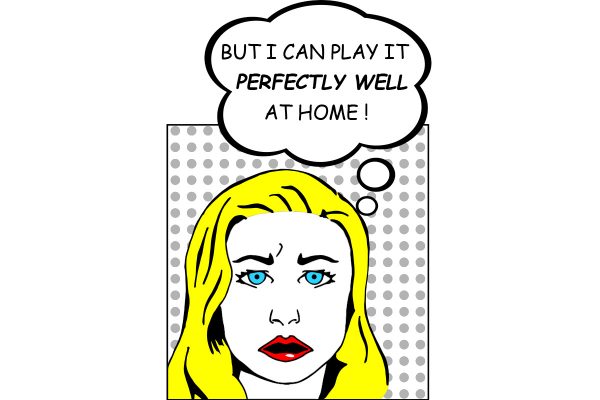When I started playing the organ I thought I had lots of transferable skills that would take me through Sunday services and the examinations I planned to take. I’d played the piano to a reasonably high standard as a teenager. I’d been a professional singer, a teacher, a lecturer. Generally getting up there and strutting my stuff wasn’t, I thought, a big issue – in fact, being well aware of some of my more lamentable personality traits, I knew I rather enjoyed showing off.
But no. With the organ, somehow, I was starting right back at the bottom.
I’ve had to learn all over again how to overcome the stiff playing, stumbles and silly mistakes, and that dreadful sinking feeling that come with performance anxiety.
Knowing you’re performing way below your capability is particularly frustrating for adult learners. You aren’t in your unselfconscious childhood, when you can play with limited competence and still everyone says you’re doing marvellously. You are acutely aware of how you compare with others. I work for the Royal College of Organists here in the UK, surrounded by folk bristling with Organ Diplomas and Cathedral appointments. So, yeah, role models, but also gravely intimidating. Sometimes when I play on Sundays I feel them standing behind me, fair but firm, noting my slipshod fingerwork, wincing slightly at a muddle in the pedals, and trying to find something kind to say to me afterwards….
So, in the quest to make my public performances as good as those I give in private, let me tell you what I’ve tried.
And I’d really like to know what YOU think. Put a comment below if you’re prepared to go public. If you’d prefer to stay private, drop me an email morwenna@theladyorganist.com I will not reveal your name, but I’d love to include your thoughts in a follow-up article.
1 classes
A very early class I wrote up for this blog was given by Daniel Moult, who suggested that you are building chunks of anxiety into a piece, if you learn it at too fast a tempo, making too many mistakes in the process. There are simple pieces I learned this way, that I still can’t play properly in public – and I’m coming to the conclusion I probably never will, for this very reason. It takes enormous self-control, but learning a piece in tiny sections, really slowly (so from the start you are playing with at least 98% accuracy) prevents this build up. More from this class here.
2 books
Mental Skills Training is a big part of sports coaching these days, and musicians have only just caught on to the fact that many playing and performance issues are mental rather than physical. So most of the best writing around the topic is still sports-related. You’ll have to cope with a lot about golf, but it’s worth it, on my page of psychology books for organists.
3 hypnotherapy
I’m a believer in hypnotherapy, particularly when anxiety appears to have attached itself out of all proportion to a situation. For performance anxiety I’m not convinced it’s the total answer, but I did enjoy working for a while with pianist/hypnotherapist Bernard King. Bernard reminded me that if you are assessing yourself as you play, then part of you is not in the performance, and in early days I think that caused a lot of self-sabotage. His website is called Confident Musical Performance, and you can download his description of how performance and anxiety are related as a pdf here.
Mark Brafield is another clinical hypnotherapist who works with performing musicians. Mark takes a neuro-scientific and evolutionary view of what causes anxiety, and is an FRCO, so he understands the particular pressures on organists. His discussions with professionals at all levels have led him to the conclusion that everyone suffers from performance anxiety and, ultimately, the only way to deal with it is to perform more and more – so when you have an off day, you just assimilate it into the pattern of experience. More on Mark’s website, Mark Brafield Hypnosis.
4 websites
Noa Kageyama discovered sports psychology when studying violin at the Juillard School. He says ‘After graduation, I put my violin down to get a PhD in psychology. And now, I’m back at Juilliard, but on the faculty, where I teach musicians how to utilize the same skills and techniques that elite athletes have used for decades.’ His engaging website The Bulletproof Musician as a mine of stories and techniques around becoming a more confident, skilled and ‘bulletproof’ musician, and I enjoy getting his regular newsletter.
Play in the Zone is another website devoted to applying the best approaches from sports psychology and translating them into concepts and exercises that directly apply to music. Mark Morley-Fletcher is a jazz guitarist, and his website offers further free reading, along with paid courses.
Did any of this work? Well, I don’t recall any damascene moment, but looking at my random notes and jottings over the last few years, I realise that I’m not strung out about the same performance issues as I used to be (just new ones HAH!) These are my current helpful take-aways:
- Knowing you are not alone. It’s worth flicking through books and websites to reassure yourself that loads of people go through this stuff. Some are just better at hiding it than others.
- Getting better at it. One of my teachers suggests that performance anxiety is directly related to how well you’ve prepared the piece. Lessons and practice, in other words getting better at it gives confidence.
- Imposter syndrome. Latecomers to the organ, and pianists-to-organists are very vulnerable to this. (How many times have I heard one of them apologise for not being a proper organist?) Get a grip. There’s no point in thinking along these lines.
- Attitude. The idea of a performance as something ‘special’ when everything has to be different and perfect is not helpful.
- Reverse engineering. Forget all the inner game psychobabble. If playing in public makes you round your back in a tense foetal crouch (eg me) then just concentrate on straightening your back and see what happens.
If you’re one of those relaxed souls for whom performance has never been an issue, tell us why! (We will applaud you through gritted teeth.) If you’ve battled with performance anxiety, or are still battling, please tell us something about it.
Comment box below is public – alternatively email me in private morwenna@theladyorganist.com
Looking forward to hearing from you.





I’d also suggest A Soprano on Her Head by Eloise Ristad. Wonderful chapters on getting rid of one’s inner judges, and her approach with performance anxiety is NOT to try to breathe, not think about, be confident, but to challenge that anxiety to BRING IT ON stronger…until you find that there’s only so much of that your body can generate, and your performance demon goes slinking into the corner as the anxiety dissipates. Good stuff.
Thanks Kay! I’ll read it – probably a good one for the booklist.
This is great…I’m totally not alone! I’ve made music all my life but never performed in public (apart from school) until I took up the organ a couple of years ago, forcing myself to deal with anxiety issues. I’ve dabbled in self-hypnosis techniques, and meditation, but the one that works best for me is the learning slowly and accurately. Anxiety very easily becomes a habit, so it’s best not to give it any airspace at all. I’ve been practising this in earnest now for the last year, and it has enabled me to successfully audition for a BMus which I started last week….something I never dreamed I could achieve. I still have the nerves, but they are much less of an issue. Thanks for the article! 🙂
Congratulations Marsha on the BMus! I too find VERY SLOW calm learning the most useful. Daniel Moult suggested in a class that you should practice sooooo slowly that you’re almost falling asleep. But it’s hard to avoid getting involved and excited by the music, so you start to speed up – have to pull myself back all the time!
Try a metronome, set really slowly and only speed up a notch at a time……. Can be hard going but it works for me!
Thanks Morwenna. At eighty I finally realise that my problem is and always has been poor memory. There appears to be no solution to this and it only reveals itself under the pressure of performance.
Peter Chatfield
Here’s a general article on performance anxiety in classical music that I found interesting today
https://interlude.hk/paralyzed-imposter-syndrome-will-good-enough/
This is wonderful! I’m so pleased I stumbled upon this! I’ve actually written two posts about performance anxiety myself (www.ruthhallows.com/post/performance-anxiety-and-i-part-1) . It’s great to see someone else writing it. It’s such an important subject that should be talked about much more publicly. Thank you for opening up about your experiences.
Ruth x
Do read cellist Ruth Hallows’ blog post which she links to above, which I found very encouraging
its
https://www.ruthhallows.com/post/performance-anxiety-and-i-part-1
…and I’m going to follow up on Sarah Knight’s books!
I had two teachers before I went to the RCM. One was an elderly village lady who unfortunately gave me many bad habits. However, without her I doubt I would have got anywhere as she had the patience of a saint with an extremely shy 6 year old who only spoke in a whisper! When I got to Grade V I moved on to a teacher who was a Professor at Trinity. I learned a lot with him but when I got to college I realised that he had taught me to imitate him and not to think for myself. I then moved on to college (and this is where my reply is relevant) and my piano teacher insisted that everything should be learned ‘a tempo’ right from the start. This was a new approach to me and I’m not at all sure it did me any good. Now I am a muddled geriatric and can’t decide which is better for me so I use a mixture of both which may well be why I don’t play as well now as I did at the age of 16!!!!
A friend has drawn my attention to Molly Gebrian’s writing on practice and the brain – here’s an article on the benefits of random, or interleaved, practice, which I’m going to try out
https://mollygebrian.files.wordpress.com/2019/04/javs-article.pdf
I loved it, how good. Maybe I have confused my art, when I make a mosaic or an oil painting I don’t get nervous. At the moment what I do is go with an electronic keyboard to the park to play. Thanks Morwenna and the rest of the commenters. //
Me ha encantado, qué bueno. A lo mejor me he confundido de arte, cuando hago un mosaico o un cuadro al óleo no me pongo nervioso. De momento lo que hago es irme con un teclado electrónico al parque a tocar. Gracias Morwenna y al resto de comentaristas.
For years, I have suffered from severe performance anxiety. I have managed to hold down church jobs, but I have been handicapped by my attitude towards public playing. However, I did manage to prepare for, and pass, my Colleague exam for the AGO, and I benefitted greatly from the preparation. The most helpful thing have have used and continue to use are materials by Mark Morley-Fischer (Play in the Zone). Although he is a jazz guitarist, he also has a doctorate in neuroscience. His writings and ideas make sense. Basically, he addresses the whole person, and it has helped. I have found Albert Franz’s writing to be helpful as well. He teaches piano and publishes KeyNotes, but his ideas are just about good preparation and thinking about the music. It is good to see that I am not alone.